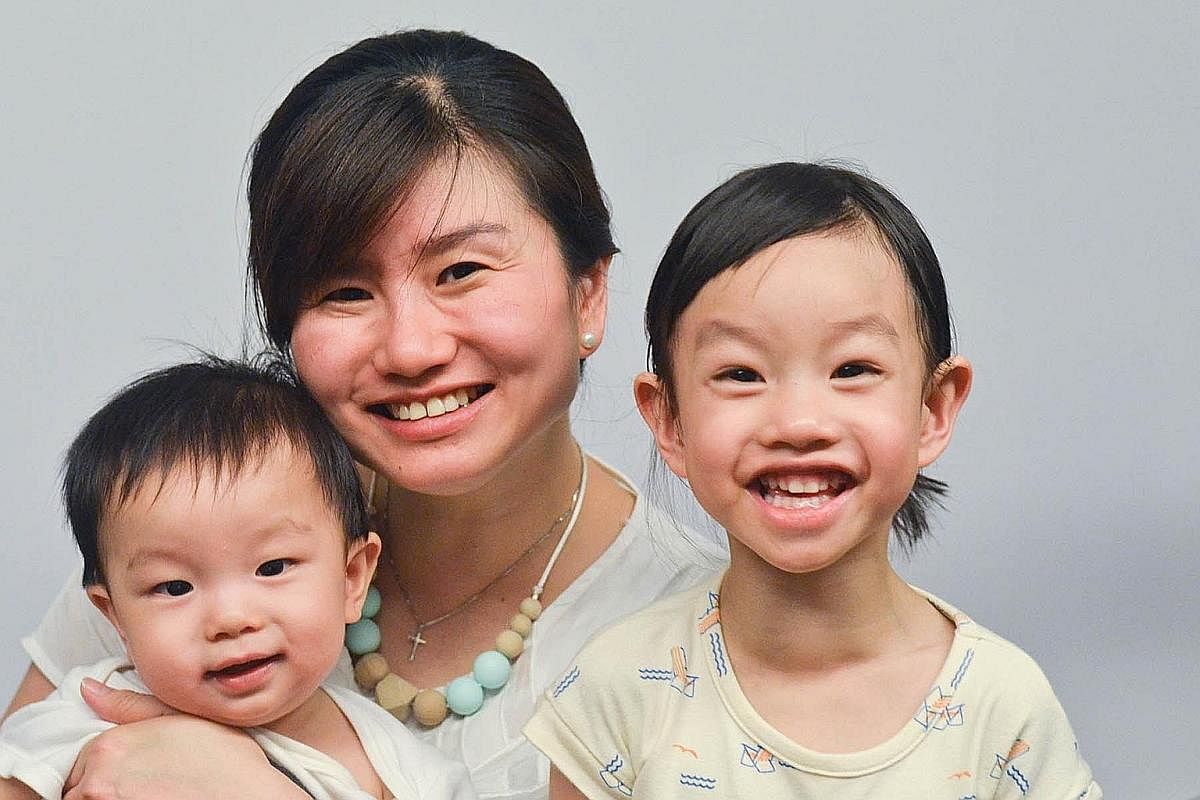Parents turn solutions for kid problems into business ideas
Inspired by the problems they face bringing up their children, some parents are turning their solutions into business ideas

The horrific realisation that mould was growing inside her daughter's favourite chew toy spurred Ms Debbie Chia to create her own line of teethers.
In December, the mother of two founded online store Annie + Alex, which sells Scandinavian-themed teethers and accessories she designed. They are made of non-toxic beech wood and food-grade silicone.
She is among a handful of local parents who have created commercial products in their attempts to find solutions to problems they encountered during their parenting journey.
Mrs Charmaine Chee designed jewellery that doubles as teethers. Ms Sylvia Seow produces play dough that is safe to taste. Mr Jeremy Tan came up with affordable and eco-friendly diaper disposal bags.

Ms Chia's journey to becoming an entrepreneur started three years ago. Her daughter Annabelle, six months old at the time, regularly sank her teeth into Sophie the Giraffe, a knobbly teething toy that is popular with parents across the world.
On one occasion during that period, her husband accidentally sat on the toy and a black, foul- smelling liquid squirted out of its air hole. The substance was mould.

"It was so disgusting. I could not believe it. I immediately threw it away," says Ms Chia, 33.
She had cleaned the toy regularly before the incident and suspects the mould is a result of moisture entering the toy from the air hole.
She then tried to look for other products in the market, but could not find any satisfactory alternatives and resorted to letting Annabelle gnaw on her pacifier whenever she was teething.
When her second child Alexander was born last year, she found teethers made of silicone beads being sold online. After including shipping costs, getting one of these sent from Australia would have cost her $60.
Not wanting to pay the hefty price, she decided to make a teether for him. She started researching suitable materials - some grades of silicone are said to be mould-resistant - and then sourced around for suppliers, but they sold the materials in bulk.
That was when she decided to try to turn her idea into a business.
The former bank employee sank "a few thousand dollars" of her savings into the business and has already broken even.
She tries to come up with new designs every two to three weeks "to keep things fresh". There are close to 20 products on her website.
"I used to just buy whatever was popular among parents, but this time, I tried to create something rather than follow a trend," she says. "I feel very accomplished about what I've done so far."
Fellow parent-preneur Mrs Chee, 29, can attest to experiencing that same sense of satisfaction.
She founded online store Lluie this year. It specialises in handmade "mum jewellery", kids necklaces and teether toys that are made of "100 per cent non-toxic" materials. Items in her mum jewellery range include necklaces and bangles made of silicone and wood.
After her daughter Delia was born last year, she found that she could no longer wear her costume jewellery as her infant would try to bite the items or place them into her mouth.
Her solution: create jewellery that was stylish and functional.
The bangles and necklaces allow mothers to accessorise while being safe enough for their little ones to chew on and fiddle with.
She started doing research last October and launched the business in January.
Although she has spent a fivefigure sum on the venture and has yet to break even, she says: "When I see Delia playing with the necklace or chomping on it, it makes me happy. It tells me that I've done something good."
Former teacher Sylvia Seow, 30, went into business selling taste- safe play dough she created after she received requests from her friends to make it for their children too.

She is one of two mothers behind Messy Fingers, an online shop launched last July that sells taste- safe play dough and play dough kits.
The duo began making play dough for their children for fun, spurred on by their doubts about whether commercially available play dough was truly non-toxic as was claimed on product labels.
They found a recipe online, perfected it and developed a play dough that they were satisfied with.
The play dough they make is coloured with food-grade colouring and scented with essential oils such as lavender and lemon. It is squishy, but non-sticky.
As the play dough made their rounds on play dates, other mothers were impressed by its quality and smell.
Before long, Ms Seow and her partner were getting requests to make the play dough.
"It's been nice seeing kids having fun with our play dough. We want to share with others the joy of playing," she says.
The duo have spent a low fourfigure sum on their business so far. They say order numbers have been growing and they have even received overseas inquiries about their products.
They most recently launched a botanicals series, with play dough scented with essential oils such as chamomile and eucalyptus.
During festive seasons such as Christmas, they also launch limited-edition play dough that comes in scents such as chocolate, peppermint and vanilla.
Many of these parent-preneurs are mothers, but there are also fathers who have created novel products for families here.
One such father is Mr Tan, 33, a director in his family's wholesale and export packaging business.
When his daughter Sophie was born in 2015, he found that her soiled diapers stank up the home.
Without a rubbish chute in the house, he and his wife placed dirty diapers in a bag and disposed of them at the end of the day in a dustbin outside their home.
"The smell was just awful by the end of the day," he recalls.
He did his research and found that well-made diaper disposal bags were readily and cheaply available in other countries, but not here. The brands he found here were either too expensive (costing roughly $10 for about 40 pieces) or of a poor quality (too thin, likely to tear or the scent did not last).
He decided to leverage on his family business' contacts to come up with a diaper disposal bag that would be eco-friendly and yet reasonably priced.
A few months after Sophie's birth in 2015, he succeeded in launching QuickGrab Fragranced Nappy Disposal Bags. The bags, which cost $4.50 for 125 pieces if bought online, are made of biodegradable plastic and each is sized to fit an individual diaper, so there is no unnecessary plastic wastage.
The fragrance neutralises the odour and the bag can be tied up, which further locks in the smell.
Buoyed by positive feedback of the diaper disposal bags, Mr Tan went on to create two other products, QuickGrab disposable bibs and waterproof pads. The pads can be used to line strollers, car-seats or changing tables. These were launched last year.
He has spent a five-figure sum on the products so far and estimates he will make a profit within the next six months. He plans to expand the product range and export them to South-east Asia.
Most of his time is still focused on the family business, but he hopes to find more time for the QuickGrab range.
He has also partnered Forum The Shopping Mall to have his diaper disposal bags available in its parent- care rooms, and is in talks with other malls and childcare centres to do the same.
"I'm proud of the products because I use them often, especially when we travel for family holidays," he says. "This was made by parents, for parents."
Join ST's Telegram channel and get the latest breaking news delivered to you.
A version of this article appeared in the print edition of The Sunday Times on April 30, 2017, with the headline Parents turn solutions for kid problems into business ideas. Subscribe

